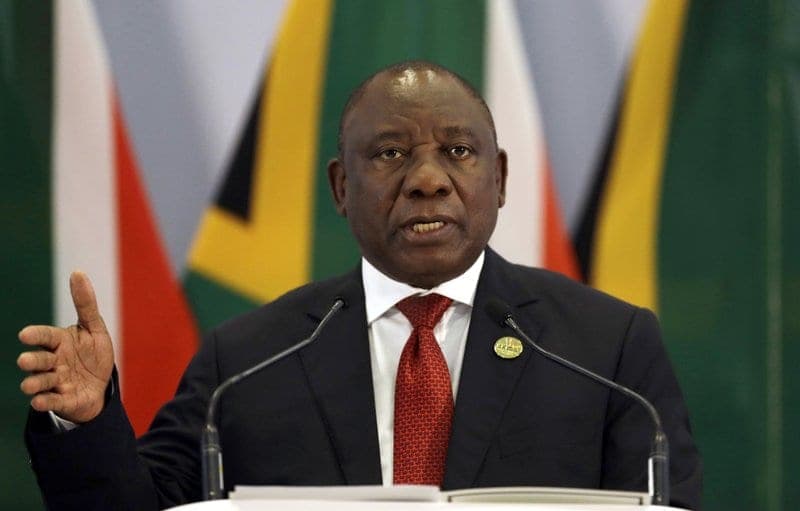YAOUNDÉ, Cameroon – Land redistribution without compensation has become a thorny political issue in South Africa. While there is consensus that such redistribution is necessary, there is no agreement on how it should be accomplished.
It is not just wealthy individuals being targeted: Leftist political parties have also set their eyes on land owned by the Church.
The spokesperson for the far-left political party Economic Freedom Fighters, Sam Matiase, said the Church is “not holier than thou,” adding that Church lands “must be put under the custody of the state for the benefit of people.”
The president of the Southern African Bishops’ Conference Justice and Peace Commission, Bishop Bishop Abel Gabuza of Kimberly, said the call to expropriate Church land is wrongheaded.
“The point is that the Catholic Church under the Commission of Justice and Peace has a land desk. In 2004, the Catholic Church studied the amount of land owned by the Church in various dioceses in South Africa. This land audit compiled by the Catholic Church does indicate that various dioceses took a decision to distribute whatever land that was not used for the benefit of the various communities. As such, larger pieces of church -owned land have already been disposed of. I speak of the Catholic Church,” he told Crux.
Gabuzza said the EFF’s call was probably based on perceptions that the Catholic Church has large pieces of land even today, but he added these perceptions have not taken into account the uses the Church puts to the land.
“If by large pieces people refer to the many structures the Catholic Church has in this country, then we can state that on such pieces we have built schools, clinics, mission stations, parishes, convents, priests’ houses, preschools, old age homes etc. If expropriation without compensation will mean the Church will lose the land and structures on this land, I fear that there will be chaos and a situation that will go out of control,” he said.
The SACBC does recognize the historical injustice done to the majority of South Africans who were dispossessed of their lands during colonialism and apartheid. Gabuza said the Church can’t stand in the way of efforts to correct that historical wrong.
“I think we need to begin to operate from the premise that land in our country has to be distributed. All sensible people in this country do acknowledge that because of colonialism and apartheid, there was injustice done to the majority of the people of South Africa,” he said.
“People were robbed of their land, people were removed from their ancestral land and laws were made to deprive others access to the land. The vast tracks of land were handed to the minority and the majority had less access to the land. If we are to speak of restitution and the response to the challenge of genuine reconciliation in this country, there is a need to address the question of land. This is imperative and should not be delayed,” the bishop told Crux.
The need for an equitable and just redistribution of land in South Africa was already captured in a 2012 document published by the Justice and Peace Commission titled: “Catholic Church Vision for Land Reform in South Africa.”
It stated: “If a way to just land distribution and efficient land productivity is not found, not only is there a great danger of violent conflict erupting in our midst, but the food security of our nation and our region is threatened. It is therefore an issue that concerns all people of this country and this region – including the Church.”
Gabuza therefore called for a “creative response” to the delicate issue of land redistribution, insisting on the “need to be aware of the fear that some South Africans have over the idea of land being expropriated without compensation. We speak of the need to have a creative response on this delicate issue of the land and take into consideration the need to distribute and the need to respond to the fears.”
White farmers in South Africa have been worried about the prospect of losing land without any form of recompense.
Tommie Estherhuyse, a white South African farmer in the Free State province warned that “If this goes ahead, we are looking at economic suicide. We are going to end up like Zimbabwe.
White South Africans, making up 7 percent of the population, own 72 percent of farmland; the majority black people, making up 76 percent of the population, own just 4 percent.
In February, the South African parliament passed a motion to amend Section 25 of the constitution to allow for the expropriation of land without compensation, after it was proposed by the Economic Freedom Fighters.
The country’s President, Cyril Ramaphosa, took a more conciliatory tone, saying that he was going to initiate dialogue with key stakeholders.
“There is no need for any one of us to panic and start beating war drums,” the president said.
“We are going to address this and make sure that we come up with resolutions that resolve this once and for all. This original sin that was committed when our country was colonized must be resolved in a way that will take South Africa forward,” Ramaphosa continued.
The matter is now being examined by the Constitutional Review Committee in parliament.
“We will have to wait until the work of the Review Committee has been finalized and presented to Parliament for debate,” Gabuza said.
“The Catholic Church has responded years ago to the distribution of land in various dioceses. There was awareness that justice should be seen to be done by the Catholic Church and so land being something delicate and sacred has been shared to people who need it most,” the bishop told Crux.















